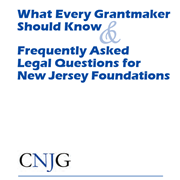Site Search
- resource provided by the Forum Network Knowledgebase.
Search Tip: Search with " " to find exact matches.
Why are so many nonprofits having trouble filling jobs? Why are so many employees leaving the sector? Because too many nonprofit jobs are burnout jobs!
Funders and nonprofit managers can prevent burnout and create sustainable jobs that allow employees to not just support their families and enjoy work-life balance, but truly flourish.
This interactive workshop--led by by Staffing the Mission facilitators Betsy Leondar-Wright and Mariah Casias--will present practical strategies for philanthropic and nonprofit organizations to enhance job quality, based on recommendations from three sections of the Sustainable Jobs Toolkit:
Work/Life Balance
Grantmaker/Grantee Communication
Sustainable Compensation Policies
Participants will share their understandings of burnout conditions to avoid, and will leave with concrete next steps for improving employee experience at their own nonprofit organization or for their grantees.
Payment is sliding scale
How can family philanthropies ensure their internal operations and grantmaking practices are disability- inclusive?
One in four US adults—61 million people—have some type of disability, but few people working in philanthropy self-identify as disabled. There is a growing recognition across the philanthropic sector that to advance diversity, equity, and inclusion, it must approach its work through a disability lens. For funders, there are opportunities throughout their work to shift internal operations toward more equitable and values-aligned practices. In this interactive session, we focus on embedding disability and inclusion in operations and learn best practices to embed disability inclusion in their internal practices, processes, and policies.
Cost: This event is free for CNJG Members who are family foundations.
Other types of foundations are ineligible to join this webinar.
This program is a CNJG membership benefit for family foundation members, including staff and trustees, in partnership with the National Center for Family Philanthropy.
Six million immigrants in the US have jobs that could increase their risk of contracting the virus -- from physicians and home health aides to agriculture and food production workers. Another 6 million work in areas that have suffered major financial loss, including the restaurant and hospitality industry, in-home childcare, agriculture, and building services.
Yet, documented and undocumented immigrants are ineligible for federal relief funds and government-sponsored safety-net programs. Many “essential” workers lack health insurance. Language barriers often make getting services difficult. And, fear of repercussion if they test positive for COVID or uncertainty around immigrant policies prevent many immigrants from even seeking assistance.
During this webinar briefing, we will hear from Abel Rodriguez, Director for the Center on Immigration and Assistant Professor of Religion, Law, and Social Justice at Cabrini University and Sara Cullinane, Director of Make the Road New Jersey.
Topics will include:
• How immigrants and their families have been impacted by COVID, nationally and in our state.
• Supporting immigration policies and programs that advance the social and economic well-being of immigrant populations.
• Efforts in New Jersey communities to provide direct support, education, and other needed resources to immigrants during the pandemic.
Nearly 1 in 4 New Jersey residents is an immigrant. And despite their vital importance to this state and our country’s culture and economy, immigrants are often left out of programs and denied services that are critical for recovery. Join us for an important briefing on why your organization’s response to COVID must uplift immigrants and their families – now and for the future.
Cost: Free for CNJG Grantmakers. $50 for Non Member Grantmakers
Webinar Video

This guide was designed to help the state’s philanthropic community understand their ethical, legal, and fiduciary requirements and obligations.
Philanthropic organizations of all shapes and sizes are well positioned to support Communities for a Lifetime (CfaL). This issue brief explores four roles for philanthropy in advancing CfaL work.
Grantmaking at the Crossroads is a workbook designed to provide foundations with a new grantmaking methodology that works at the intersection of place, population, and issue. It offers a pathway to greater inclusion of communities that are often excluded or marginalized by foundation funding and enables foundations to maintain their focus and priorities while expanding their reach and effectiveness.
The Grand Rapids Community Foundation and the Kalamazoo Community Foundation volunteered to be laboratories for Grantmaking at the Crossroads and have been critical informants for this workbook. Each of these foundations holds an unwavering commitment to ongoing learning; this publication would not have happened without their support and engagement and the financial support of the Arcus Foundation.
This publication from Grantmakers for Effective Organizations offers a framework for thinking about how to measure progress and results in place-based and community change initiatives.
Two different CNJG members queried the CEO listserve on how/when/how to return to the office following the COVID-19 pandemic. CNJG staff compiled the answers from the responding members removing identifying information of the respondents.
A CNJG member received an application from a school district, and wanted to know if others granted funds to a school district, and what other funders learned from granting to a district.
"Co-Creation" is a case study about the Connecticut Early Childhood Funder Collaborative, a project of the Connecticut Council for Philanthropy. The case study, written by Patricia Bowie, examines co-creation, an emerging systems change collaboration model which grew out of a funder-and-state partnership. This unique partnership led to the creation by executive order of a new and independent Office of Early Childhood, which was formally approved by the Connecticut State Legislature in 2013. The companion piece, "Taking on New Roles to Address 21st Century Problems," looks at co-creation from the perspective of a regional association of grantmakers.
The Connecticut Early Childhood Funder Collaborative comprises 14 funders from around the state who bring many years of experience in supporting and operating programs that serve the needs of children and families.
